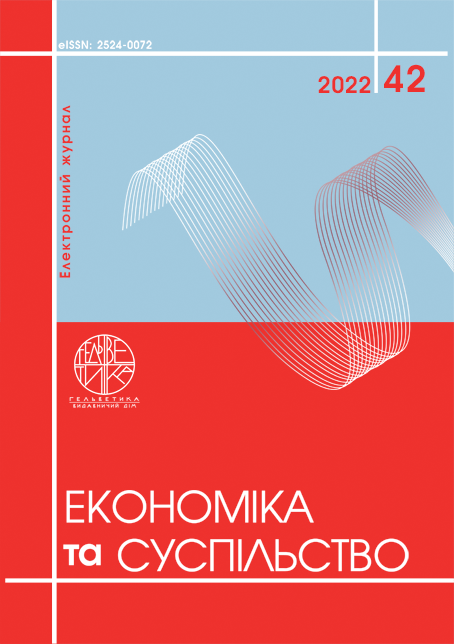PERSONNEL MANAGEMENT STRATEGIES IN THE ENVIRONMENT OF THE KNOWLEDGE ECONOMY
Abstract
The aim of the study is to substantiate the role of personnel strategy in the environment of the knowledge economy and to determine the types of personnel strategies that are most effectively able to support the process of producing new knowledge in the organization. The research is relevant due to two aspects. Firstly, the special role of personnel strategy in the organization's knowledge management system. Secondly, the rapid growth of the need of society and organizations for new knowledge in connection with the transition of the economy of Ukraine to the principles of a military economy from February 2022 due to the full-scale invasion of russia. The conducted research is based on the monographic method, the methods of comparative and logical-structural analysis, as well as the analysis of the author's experience in designing personnel strategies. It is proven that in the environment of the knowledge economy, the personnel strategy should be aimed at the formation and development of "knowledge creators" and at the accumulation of human capital through the introduction of modern personnel management technologies. The variety of types of personnel strategies in modern management in the coordinate system "level of management development" and "current state of the organization" is summarized. Five types of personnel strategies which should be implemented to cover the current need of society (organization) for new knowledge are distinguished. They are team-building, partnership, shared value strategy, strategy focused on collective knowledge, anti-crisis strategy. One of the results of the study is the determination of the purpose and priority technologies of personnel management for these types of personnel strategies, as well as the formulation of the basic priorities of the personnel strategy in the conditions of the development of the knowledge economy. The practical value of the article arises from the fact that the scientific and applied results presented in it can be used to increase the effectiveness of the influence of the organization's management on the spread of the knowledge economy.
References
Геєць В.М. Про характер перехідних процесів до економіки знань. Економіка знань: виклики глобалізації та Україна / під заг. ред. А.П. Гальчинського, С.В. Льовочкіна, В.Л. Семиноженка. Київ : Владар, 2004. 261 с.
Гондюл О. Future of Work 2030: як українська молодь бачить майбутню роботу. URL: https://mind.ua/openmind/20224503-future-of-work-2030-yak-ukrayinska-molod-bachit-majbutnyu-robotu (дата звернення: 01.06.2022).
Збрицька Т.П., Сорока О.В. Управління персоналом в епоху цифрової економіки. Економіка та суспільство. 2021. Випуск 31. URL: http://www.economyandsociety.in.ua/index.php/journal/article/view/687/660 (дата звернення: 15.05.2022).
Колот А.М., Герасименко О.О. Праця ХХІ: філософія змін, виклики, вектори розвитку : монографія. Київ : КНЕУ імені Вадима Гетьмана, 2021. 487 с.
Людський капітал 2030. URL: https://drive.google.com/file/d/1XHZeW0b4NwPFgI1Wa7XOeCT1Ml6mqD6c/view?fbclid=IwAR3sslqSz743NyCNNp4KEZsPhKQdBVXk0s-kediol9X6bJZu2VknHHGVCUs (дата звернення: 01.06.2022).
Подлужна Н.О. Економіка знань: проблеми та перспективи формування в регіонах України : монографія. Харків : ФОП Панов А.М., 2018. 416 с.
Світлична В.Л. Теоретичні базис нової парадигми суспільства – економіки знань. Економіка: реалії часу. 2015. № 3 (19). С. 184–193.
Heiets V.M. (2004) Pro kharakter perekhidnykh protsesiv do ekonomiky znan. Ekonomika znan: vyklyky hlobalizatsii ta Ukraina [About the nature of transitional processes to the knowledge economy. Knowledge economy: challenges of globalization and Ukraine] / pid zah. red. A.P. Halchynskoho, S.V. Lovochkina, V.L. Semynozhenka. Kyiv: Vladar. (in Ukrainian)
Hondiul O. Future of Work 2030: yak ukrainska molod bachyt maibutniu robotu [Future of Work 2030: how Ukrainian youth see future work]. Available at: https://mind.ua/openmind/20224503-future-of-work-2030-yak-ukrayinska-molod-bachit-majbutnyu-robotu (accessed June, 1, 2022).
Zbrytska T.P., Soroka O.V. (2021) Upravlinnia personalom v epokhu tsyfrovoi ekonomiky [Personnel management in the era of the digital economy]. Ekonomika ta suspilstvo – Economy and society, vol. 31. Available at: http://www.economyandsociety.in.ua/index.php/journal/article/view/687/660 (accessed May, 15, 2022)
Kolot A.M., Herasymenko O.O. (2021) Pratsia ХХІ: filosofiia zmin, vyklyky, vektory rozvytku: monohrafiia [Work XXI: philosophy of change, challenges, vectors of development: monograph]. Kyiv: KNEU imeni Vadyma Hetmana. (in Ukrainian)
Liudskyi kapital 2030 [Human capital 2030]. Available at: https://drive.google.com/file/d/1XHZeW0b4NwPFgI1Wa7XOeCT1Ml6mqD6c/view?fbclid=IwAR3sslqSz743NyCNNp4KEZsPhKQdBVXk0s-kediol9X6bJZu2VknHHGVCUs (accessed June, 1, 2022)
Podluzhna N.O. (2018) Ekonomika znan: problemy ta perspektyvy formuvannia v rehionakh Ukrainy: monohrafiia [Knowledge economy: problems and prospects of formation in the regions of Ukraine: monograph]. Kharkiv: FOP Panov A.M. (in Ukrainian)
Svitlychna V.L. (2015) Teoretychni bazys novoi paradyhmy suspilstva – ekonomiky znan [The theoretical basis of the new paradigm of society – the knowledge economy]. Ekonomika: realii chasu – Economy: realities of time, vol. 3 (19), pp. 184–193.


